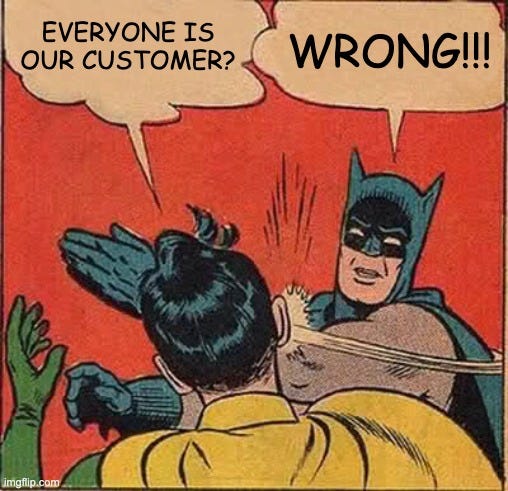Everyone is NOT Your Customer: The Risk of a Missing ICP
Why Knowing Why Your Customer Buys is More Important than Knowing Who
“Everyone is our customer?!” 🤨 🚩🚩🚩
A few years ago, I was invited to sit in on a leadership meeting with a prospective client. It was one of those classic C-suite gatherings, with top-level execs gathered around a big table. I didn’t know much about their category but joined in, eager to learn and observe.
As we got into the meeting, I asked what seemed like a simple question:
“Who is the customer?”
What happened next left a lasting impression on me.
Silence. 🦗🦗🦗 (Cue the crickets.)
The Chief Product Officer (CPO) and Chief Revenue Officer (CRO) exchanged glances. After a moment, one of them finally responded with, “Everyone is our customer.” 🚩
That statement—though probably well-intentioned—was a red flag.
Here was a successful company with substantial revenue, but their lack of a clear Ideal Customer Profile (ICP) was a huge risk. Without an ICP, businesses can end up spreading their resources too thin, leading to confusion across product development, marketing, and sales. In my experience, it’s a recipe for misalignment and missed opportunities.
I’ve been an advocate for knowing your customer for years. But recently, I watched a YouTube video from Ash Maurya that offered a fresh perspective. His insights on why startups often struggle with customer personas gave me a new lens through which to view the importance of defining your ICP.
Personas vs. Triggers: A Shift in Perspective
Maurya’s insight? Instead of focusing on personas built from demographics or psychographics, focus on switching triggers—the events that drive someone to abandon their current solution and seek something new. Demographics may tell you who a customer is, but it’s the switching triggers that tell you why they buy. This subtle shift in focus can make all the difference.
In established companies, like the one in my story, this approach is just as critical as it is for startups. Growth can blur the clarity that an ICP provides, leaving businesses unsure of who they’re truly trying to reach. And when a company believes “everyone is our customer,” they often end up reaching no one effectively.
What Are Switching Triggers?
Switching triggers are specific events or conditions that prompt a customer to seek a new solution. These can be things like:
Bad Experiences with a current solution
Significant Changes in Circumstance (e.g., a new life stage, like moving in with a partner)
Awareness Events (like receiving advice from a trusted source)
Maurya shared a memorable story to illustrate this. A well-known mattress company discovered that many of their customers were making purchases at 2 a.m. Why? Because they were awake, struggling with sleeplessness on their old mattresses. By focusing on this switching trigger—insomnia—the company ran ads during late-night hours and saw a big boost in sales. They didn’t target a specific demographic; they targeted the need. They tapped into the why.
Imagine if, instead of looking at age, income, or geography, your business understood the underlying motivations that drive customers to switch. You’d focus your efforts on those critical moments, rather than casting a wide net and hoping for the best.
The Takeaway: Know Why Over Who
Here’s the big idea: Knowing “why” a customer buys is more powerful than knowing “who.”
For years, I’ve encouraged companies to develop a clear ICP. But thanks to Ash Maurya, I’ve gained a new appreciation for switching triggers as a way to refine that profile. Whether you’re a startup or an established business, understanding why customers switch can help you align your product, marketing, and sales efforts more effectively—and grow more sustainably.
Ready for a Fresh Look at Your ICP?
If you’re interested in learning more about switching triggers and how they could impact your ICP, I highly recommend watching Ash Maurya’s full video. He delves into the reasons customer personas fail and offers actionable insights that could change the way you think about your target market. Check it out here.
And ask yourself: When was the last time you reviewed your ICP? Is it time for a refresh?


